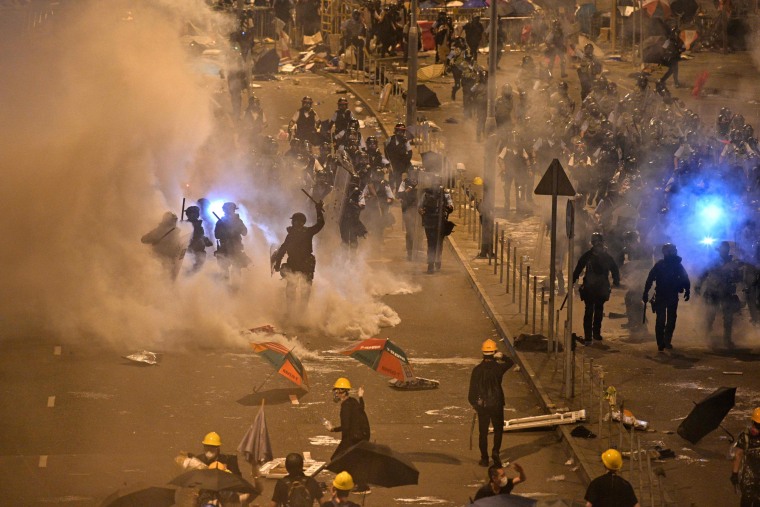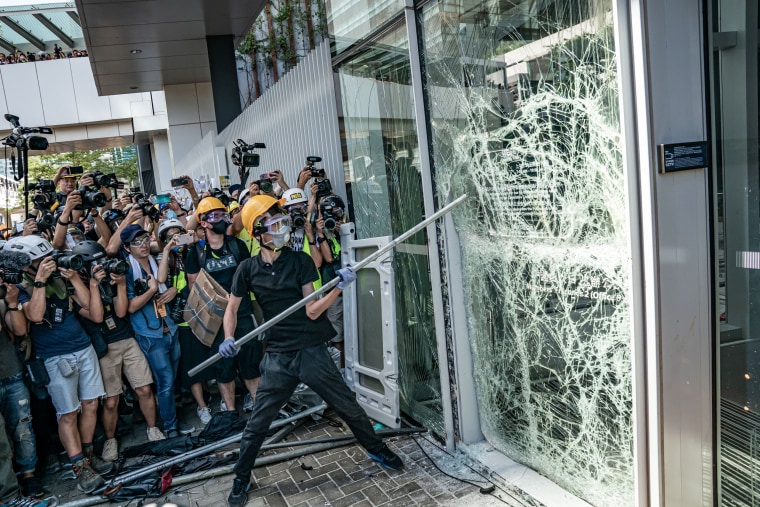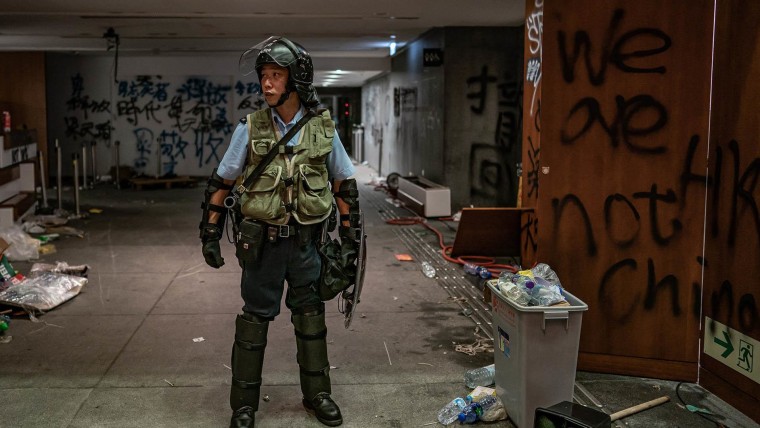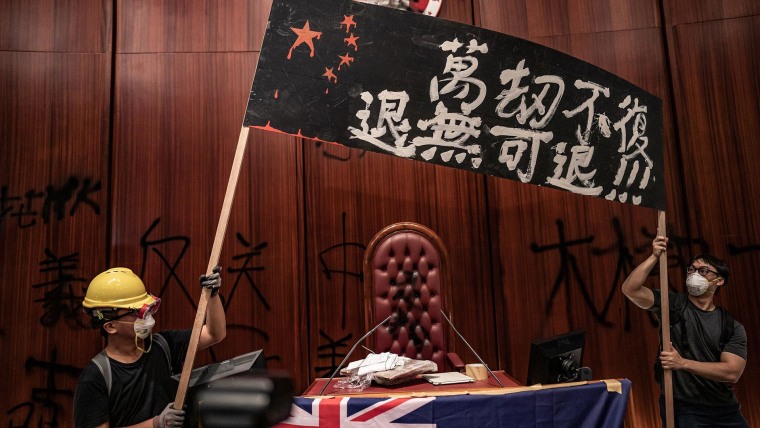风萧萧_Frank
以文会友Hong Kong protesters smash way into legislative building on anniversary of Chinese rule
The clashes flared outside a flag-raising ceremony marking 22 years since the former British colony was given back to Beijing.
The protesters defaced Hong Kong's emblem, tore down portraits of legislative leaders and wrote messages on the chamber's high wooden wall calling for the resignation of Carrie Lam as Hong Kong's chief executive and leader.
The protesters draped a colonial Hong Kong flag — with Great Britain's Union Jack in the upper-left-hand corner — on the podium where Legislative Council President Andrew Leung would normally sit.
The protesters, many wearing hardhats or carrying umbrellas, spray painted slogans on chamber walls such as: "Carrie Lam step down," "No extradition to China" and "Release the righteous" protesters who have been arrested.
Then shortly after 12 a.m. Tuesday (noon ET, Monday) police in riot gear began firing tear gas at protesters outside.
By this point most of the protesters had left the legislative chambers, with people chanting inside “leave together.” Only four were remaining inside as the clock hit midnight.
Police had regained control of the Legislative Council chambers and the surrounding neighborhood within an hour of the tear gas.

Police fire tear gas at protesters near the government headquarters in Hong Kong on July 2, 2019.Anthony Wallace / AFP - Getty Images
Lam called a press conference shortly after 4 a.m. Tuesday in Hong Kong (4 p.m. Monday ET) to decry the violence. She said the storming of the chamber was an "extreme use of violence and vandalism" that "really saddens and shocks a lot of people."
"This is something we should seriously condemn because nothing is more important than the rule of law in Hong Kong," she said.
Earlier, police had tried to hold back the protesters by using riot shields and pepper spray, and the secretariat of the Legislative Council issued a "red alert" for all staff inside to immediately evacuate the building.
Protesters got into the chamber after they fashioned a make-shift battering ram out of wheeled, metal cart which are ubiquitous around the bustling city.
Police said protesters "violently attacked and forced" their way in "illegally."
"The police severely condemned the violent attack," according to a police statement. "The police will conduct sweeping in a short period of time and will take reasonable force."
The activists are calling for the total withdrawal of a proposed law that would allow suspected criminals to be extradited from Hong Kong to the Chinese mainland.
Outside, some 550,000 people were flooding the city's streets for the annual July 1 march, marking the day in 1997 when this former British colony was handed back to China.
The march is usually a general demand for democracy and human rights. But this year's procession carries much sharper resonance, coming after around a month of mass protests against the proposed extradition law.
The city was supposed to retain its own political and economic system after leaving U.K. rule. Critics say the law is part of attempts by Beijing to erode those freedoms, edging Hong Kong toward China's political and legal system, which rights groups say is rife with abuses and is used to silence political opponents and dissent.
U.S. National Security Adviser John Bolton said Washington expects China to keep its promise to maintain "one country, two systems" in Hong Kong through 2047.
Bolton said Monday during a brief visit to Mongolia he expects "China, like every other country, to adhere to its international obligations" regarding the former British colony.
British Foreign Secretary Jeremy Hunt on Monday walked a fine line, tweeting that the U.K. is "unwavering" in their support of democracy while also saying "no violence is acceptable."
.@Jeremy_Hunt says he "understands the worries" of the #HongKongProtesters.
— Sky News (@SkyNews) July 1, 2019
The foreign secretary says he will never take his freedom for granted.#BattleForNumber10
For live updates on the interview, click here: https://t.co/kuPWHyvTwY pic.twitter.com/ZrBJdQ4KT6
"My heart goes to out to people who do have to fight for their freedoms and who are worried they could lose (a) very very precious way of life," Hunt later told Sky News. "I don't support violence in any circumstances. But I understand their worries about changes that are happening in Hong Kong."
Hunt warned against any action that undermines the 1984 agreement, signed by Great Britain and China to maintain Hong Kong freedoms for 50 years after the 1997 handover.
"That has been the foundation of Hong Kong's success, so I really hope that there aren't changes in Hong Kong that undermine that agreement, which is a legally binding agreement between Britain and China," Hunt said. "We stand behind what was in that agreement. We stand behind the freedoms that it enshrined. And we stand behind the people of Hong Kong."
The recent unrest has been sparked by the proposed extradition law that its backers insist is necessary to stop the semi-autonomous region from becoming a haven for fugitives.

The government indefinitely suspended it after the protests and Lam apologized. But this has not satisfied the protesters, who want the bill to be scrapped for good and for Lam to resign.
One student, Rick, 23, was one of those moving barriers outside the government building. He said he did not smash anything himself but understood why others were doing so.
"People are fed up, the anger is building up and they need to vent it out," he said, declining to give his last name for fear of prosecution by authorities. "I think this is what triggered what is happening now."
Another, Lindsey, 21, also declining to give her full name, said, "It's tiring, but this is the only thing we can do." She added, "If we don’t come out, we never know if we will have the chance again in the future."
Earlier, protesters clad in masks and hard hats tried to advance down closed streets toward a venue where a flag-raising ceremony was taking place marking Hong Kong's handover.
Shielded by dozens of others wielding umbrellas — a symbol for Hong Kong protests in 2014 — they later ripped down at least one of these panes and dozens flooded inside. Elsewhere, protesters tore off the metal bars of a gate leading into the building.
The larger demonstration outside capped more than a month of mass demonstrations in Hong Kong, the largest of which saw some as many as 2 million of the city's 7 million residents flood the streets.
Mainland China's state-run media made no mention of Monday's mass protests in Hong Kong.
The Community Party organ, China Daily, ran a cheery, upbeat story about Lam speaking at an event on July 1 — marking 22 years since the British relinquished rule of the island to Beijing.
The China Daily said Lam "vowed humbly" to "continue to listen to the community's views and make continuous improvement to our work."
Veta Chan reported from Hong Kong, Alexander Smith reported from London and David K. Li reported from New York.
Alexander Smith is a senior reporter for NBC News Digital based in London.
David K. Li is a senior breaking news reporter for NBC News Digital.








